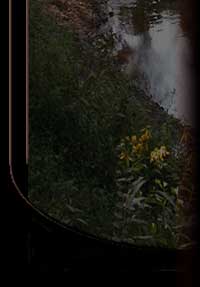CFI Educational Programs
CFI Program
Introduction to Northwest Georgia Archaeology |
| Program Length |
45 minutes to 1 hour |
| Program Location |
portable (schools, libraries, etc.) |
| Program Format |
slide presentation |
| Grade Level/Audience |
grades 6-12; general public |
| Maximum Audience |
unlimited; 1 class to full auditorium |
| Prerequisite |
none |
This instructional program provides a basic overview
of the science of archaeology, and what archaeologists have
learned about the prehistory and early history of Northwest
Georgia. The program focuses on the Native American inhabitants
of the Coosawattee River valley of Gordon and neighboring Murray
Counties, including not only the familiar Cherokee Indians,
but also their predecessors in this area. Students and audiences
will learn about the importance and fragility of the archaeological
record, and what this record teaches us about the long history
of cultural development among American Indian groups, and how
these groups interacted with their natural environment over
the course of nearly 12,000 years.
Some questions addressed during the program include:
- What is archaeology, and how and why do archaeologists
learn about the past?
- Why are geography, geology, ecology, and other sciences
important for understanding ancient human cultures?
- How and when did the first American Indians arrive in
Northwest Georgia?
- How did human cultures change over the centuries, and how
do such changes relate to human population growth and limitations on food and other
resources?
- What cultures existed in Northwest Georgia at the time of
first European contact in the 16th century, and how did they differ from earlier and later
human cultures, including our own?
- What happened to the prehistoric chiefdom known as Coosa
after the Hernando de Soto expedition in 1540, and where did the Northwest Georgia
Cherokees come from? (HINT: the Cherokees were an immigrant group that did not originally
live in Northwest Georgia)
To schedule any CFI program, or to find out more information, please
call the Foundation office at (404) 285-2001, or send an email to [email protected].
|
